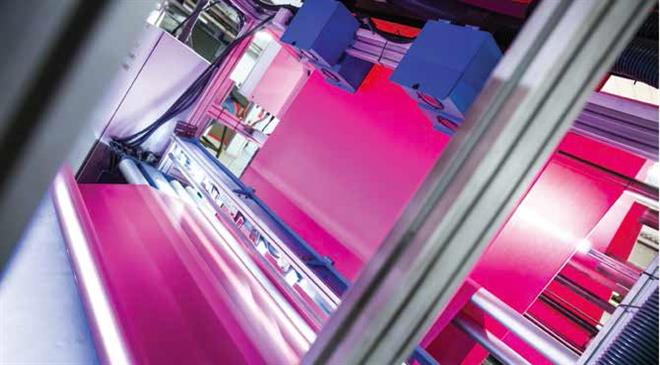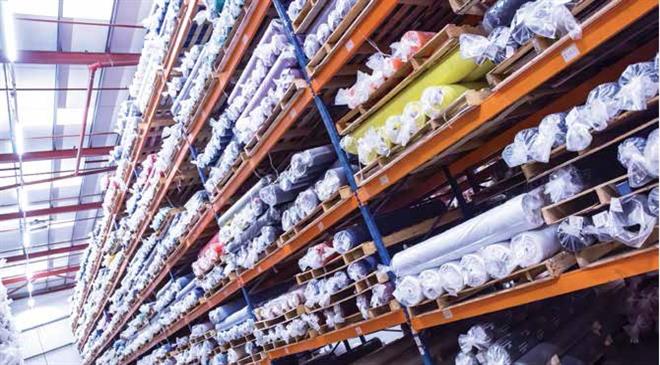Brexit one of the biggest challenges for UK textiles industry
Celebrating 130 years in 2021, Carrington Textiles is one of Europe’s largest textile suppliers to the workwear market. With bases in the UK, mainland Europe and Asia, Carrington Textiles supports many of the world’s largest employers in sectors including heavy industry, hospitality, defence and health. Paulami Chatterjee spoke to Paul Farrell, sales and marketing director at Carrington Textiles, to discuss how Brexit and the pandemic have impacted its business and the textile industry at large, and the new innovations the company is working on.
Which are the industry segments you cater to? Which has the highest demand?
We cater to several key sectors including the flame retardant, workwear, defence, and sustainable fabrics markets. Our 130-year experience in the textiles business has given us an excellent reputation globally. So, we are able to serve all industries and sectors from healthcare with our workwear fabrics, to the heavy industry with flame retardant offering.
The levels of demand vary, but we can say our success is on our flame retardant and workwear fabrics which we distribute to many industries and to over 80 geographical markets every year.
What are your key sustainability metrics that you follow at the plant and production level? What are the major international standards you adhere to, to preserve the environment and make your fabrics sustainable?
By enhancing fabric performance through continuous development in advanced technologies that are carefully implemented with respect to the environment as a priority, we have achieved standards including ISO 50001, ISO 9001 and ISO 14001 for energy, quality and environmental management respectively. Other important certifications also include Oeko-Tex that certifies fabrics meet human-ecological requirements, and Bluesign that sets and controls standards for environmentally friendly and safe production.
You recently launched an antiviral finish to protect fabrics against the SARS-CoV-2 virus. How has the response been so far?
The response for our antiviral finish for workwear fabrics has been excellent as more and more companies are looking for extra protection for their staff. The versatile nature of this finish means that it can be used in a wide range of fabrics for end uses that include face coverings, medicalwear, hospitality and retail uniforms, heavy industry workwear and armed forces uniforms, just to name a few. Independently tested in the UK under the ISO 18184 standard, featuring silver technology that deactivates viruses and kills bacteria, as well as withstanding 50 washes at 60°C, the Antiviral Finish by Carrington Textiles is one of the most versatile and durable products of its type in the market.
How was Carrington Textiles formed? What is the background story?
Carrington Textiles and our main production facility in the UK, Pincroft, share an interesting past. Both based in Lancashire, the birthplace of British textiles, Carrington Textiles and Pincroft have become one of Europe’s largest fully integrated textile processing and finishing operations.
The story dates back to the 19th century when Benjamin Davies from Adlington and his brother-in-law James Eckersley from Duxbury after buying together the Huyton Bleachworks in 1848, started operation of the Pincroft Dyeing and Printing company for bleaching and finishing of fabrics in 1891. They were experienced businessmen and fabric bleachers and back in April 1885 they had invented a ‘washing and rinsing machine’ used in bleachworks with a more efficient use of energy and water. Fast forward a century and in 1998 after joining forces with Carrington Textiles, the companies have seen a considerable increase in turnover from €50 million in 1999 to €104 million in 2019, as well as growing their export business extensively breaking into new geographical markets including Europe, Middle East, Asia and Africa.
‘Carrington is one of the best sustainable and environmentally friendly companies in the textiles world’. Which initiative beyond the given allows you this claim?
At Carrington Textiles, we are very conscious of our responsibility to our customers, to end users, and most importantly to our planet. Whether it be through our fabrics, processing, or associated initiatives. We all have a responsibility to act.
In terms of our fabrics and fibres, we have created the Balance Range, which features a range of fabrics developed by adopting sustainable technologies and processes. These include, for example, recycled polyester, bio-polyester, BCI sustainable and organic cotton, as well as Vortex spun yarns that give our fabrics greater lifespan, resulting in less textile waste.
Regarding production, we work constantly to reduce our impact on the environment. For example, we have implemented energy efficient technologies such as a combined heat and power unit as well as a power radar, all to reduce energy waste on site and lessen our impact to the environment.
What kind of capacity expansion are you planning in future?
In the UK, Pincroft Dyeing & Printing will benefit from a significant capital investment in a new combined heat and power plant, aimed at further reducing CO2 emissions and improving the facility’s carbon footprint, sustainably lowering energy consumption and costs. A five-year capex plan to modernise the factory will be put in place to ensure the factory is ready for the changing demands and product trends of the workwear market with details being released later in the year. This investment will ensure that the UK retains its competitive position for the future and has solid platform from which it can continue to build.
MGC in Portugal will also see a five-year modernisation plan, with the installation of new automatic inspection and rolling machines. Completion of the EU-UK trade deal has given clarity to the group’s ability to continue providing fabrics that are fully compliant with EU rules of origin, clearing the way for further investment in plant and machinery in this key region.

The pandemic continues to rage in your part of the world. How has it impacted business? What steps have you taken to tide over it?
As a company we all had to adapt to a new way to do things and our teams have adjusted brilliantly to the new circumstances. Communication is a particular challenge with remote working for most people, and we have therefore had to make sure that we are available and able to meet customers in the way in which they want to communicate with us, whether that’s emailing, video calling, live streaming of events, via one of the wide arrays of apps or at the end of a telephone.
On site, we are focused on keeping our key workers safe by putting measures in place to safeguard their health and safety while ensuring the production of much needed healthcare fabric wasn’t affected. For those able to work from home, we have provided the necessary support and flexibility as most of us juggle family responsibilities.
One of the biggest challenges we faced during the first months of the pandemic was the closing of borders around the world which made freight and logistics tricky for everyone.
Thankfully, our long-standing committed partners showed their support throughout; so, we were able to continue delivering our best-in-class service to customers through effective planning and communication.
How does your supply chain network work? What regions are part of your supply chain?
At Carrington Textiles, we have a truly global supply chain that has been strategically developed to reduce risk and always focused on providing the best possible service to our customers.
With manufacturing facilities in the UK (Pincroft), Portugal (MGC), Russia (Adventum Technologies) and Pakistan (Carrington Textiles International), as well as warehouses in Europe, Africa and Asia, we distribute our fabrics to more than 80 geographical markets.
What qualities do you look for while onboarding vendors in various parts of the world?
Quality and sustainability in all aspects, from production to delivery, is our primary focus when onboarding a vendor. Our commitment to our customers to provide them with the quality they need must start from the very beginning of the process and we make sure through our quality assurance and purchasing departments that this is provided.
But let’s not forget the ethical issues the textiles industry is facing— that’s why we take slavery and human trafficking issues seriously; for that reason we make sure our suppliers sign up to our ‘Code of Conduct’ that defines our position on areas such as human rights, labour, environment and corruption. Carrington Textiles will not deal with any business knowingly involved in slavery or human trafficking, and we take steps to approve suppliers that undertake relevant controls.
How is Brexit impacting business?
Brexit is one of the biggest challenges we have faced in the UK’s textile industry in a long time. To prepare for the separation from the EU and minimise uncertainty, we immediately looked within our business to assess changes and in June 2017 we formed a joint venture with TMG in Portugal under the name of MGC to help service our European production needs.
With a production capacity of 18 million metres a year, MGC gave us a production facility in mainland Europe, expanding our current production capacity in the continent to over 50 million metres. This asset removes any potential disruption due to Brexit, and gives us many options to meet customer need, wherever they are in the world.
Which are your major markets worldwide?
Our major markets are the UK, mainland Europe, the Middle East, Asia and North America.
What percentage of your products is for the domestic market and how much do you export?
We currently export 70 per cent of our fabrics to over 80 geographical markets.

What kind of new innovations are you working on with respect to workwear fabrics?
Research and development is an area of paramount importance to our business. As such, we have a strong focus on new product development, with an in-house R&D team to look at customer and market developments, ensuring that we lead in both product and service innovation. We work with several customers across our geographical markets and product sectors to continuously develop fabrics that bring performance, sustainable and commercial benefits.
Within Pincroft Dyeing & Printing, we look at continuous improvement in production processes, technologies and raw materials to ultimately offer the same benefits to our customers.
Currently, we are working on a range of biodegradable, recycled and stretch fibres, as well as treatments that enhance product performance and comfort, whilst reducing environmental impacts.



